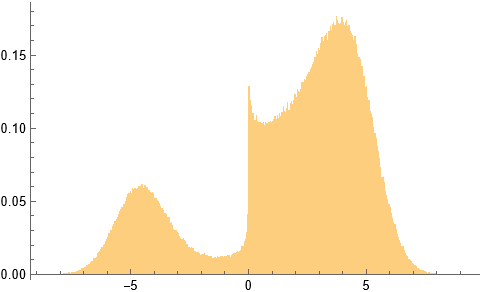Is not likely that Mathematica will return an analytical expression for such a complicated distribution. The form should be as follows, with a simpler TransformedDistribution of rho+alpha+beta and assuming variables are independent.
Assuming[
And[
Element[alpha | alpham | beta | betam | rho | rhom, Reals],
Element[sigmaa | sigmab | sigmar, PositiveReals]
],
With[
{
dist=TransformedDistribution[
rho+alpha+beta
, {
Distributed[rho, NormalDistribution[rhom, sigmar]],
Distributed[beta, NormalDistribution[betam, sigmab]],
Distributed[alpha, NormalDistribution[alpham, sigmaa]]
}
]
},
Table[CentralMoment[dist,n],{n,4}]
]
]
For me, this has been running for way too long without an answer:
Assuming[
And[
Element[alpha | alpham | beta | betam | rho | rhom, Reals],
Element[sigmaa | sigmab | sigmar, PositiveReals]
],
With[
{
dist=TransformedDistribution[
rho/(Sqrt[1+Tan[alpha]^2+Tan[beta]^2]) Tan[alpha]
, {
Distributed[rho, NormalDistribution[rhom, sigmar]],
Distributed[beta, NormalDistribution[betam, sigmab]],
Distributed[alpha, NormalDistribution[alpham, sigmaa]]
}
]
},
Table[CentralMoment[dist,n],{n,4}]
]
]


rhois involved in all of the random variables as a multiplicative factor, ifrhois independent of bothalphaandbeta, then it would be best to concentrate on dealing with the distributions of the parts that deal withalphaandbeta. In other words this reduces the issue to dealing with just 2 random variables as adding an independent multiplicative random variable is easy to include. $\endgroup$